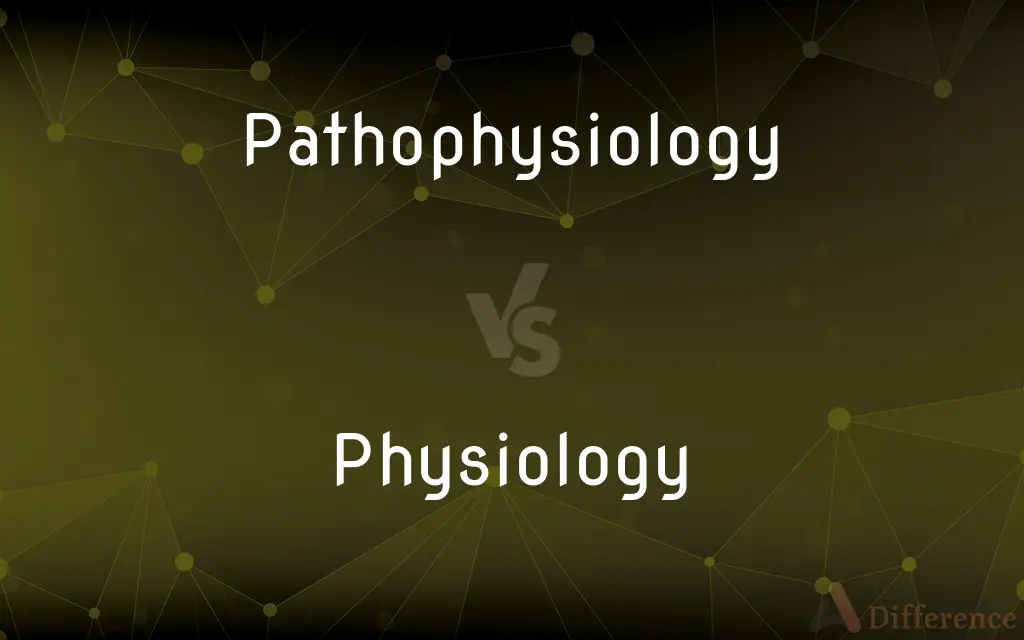Pathophysiology vs. Physiology — What's the Difference?
Edited by Tayyaba Rehman — By Urooj Arif — Updated on February 23, 2024
Pathophysiology examines the abnormal functioning of diseased organs, contrasting with physiology, which studies the normal functions of living organisms and their parts.

Difference Between Pathophysiology and Physiology
Table of Contents
ADVERTISEMENT
Key Differences
Pathophysiology delves into how diseases disrupt the normal processes in the body, aiming to understand the mechanisms behind various health conditions. It focuses on the "why" and "how" of disease states, providing insight into the changes that occur during illness.
Physiology, on the other hand, explores how the body's systems work under normal conditions, from cellular processes to organ systems. It lays the foundation for understanding the body's natural state, offering a baseline for what's considered healthy.
The study of pathophysiology is crucial for medical professionals as it aids in diagnosing and treating diseases by revealing the underlying causes of symptoms. It bridges the gap between the basic science of physiology and the clinical practice of medicine.
Physiology serves as the groundwork for all biomedical sciences, including pathophysiology. By understanding normal bodily functions, scientists and healthcare professionals can better identify when and how things go awry in disease states.
Pathophysiology focuses on abnormalities and deviations from the norm, while physiology provides the standards and benchmarks for what is considered normal biological function. This distinction is essential in the medical field for developing therapeutic strategies.
ADVERTISEMENT
Comparison Chart
Focus
Abnormal functioning due to diseases
Normal biological functions
Aim
Understand disease mechanisms
Understand how body systems operate
Application
Diagnosing and treating diseases
Providing baseline for normal health
Basis
Deviations from normal physiology
Standard bodily functions
Importance
Essential for medical practice
Foundation for biomedical sciences
Compare with Definitions
Pathophysiology
The study of the disordered physiological processes that cause, result from, or are otherwise associated with a disease or injury.
The pathophysiology of asthma involves inflammation and airway constriction.
Physiology
The branch of biology that deals with the normal functions of living organisms and their parts.
Physiology studies how the human heart pumps blood throughout the body.
Pathophysiology
Exploration of the mechanisms behind symptoms and medical conditions.
The pathophysiology of Alzheimer's disease involves the accumulation of amyloid plaques in the brain.
Physiology
Investigation of how organisms, organ systems, organs, cells, and biomolecules carry out chemical or physical functions.
Plant physiology researches how photosynthesis provides energy for growth.
Pathophysiology
Analysis of biological and physiological processes that lead to health complications.
Understanding the pathophysiology of osteoporosis helps in developing better treatments.
Physiology
The science of the mechanical, physical, and biochemical functions of humans.
Respiratory physiology examines how oxygen is transferred into the lungs.
Pathophysiology
The science of the effects of diseases on organ or system functions.
The pathophysiology of diabetes includes impaired insulin production and glucose regulation.
Physiology
The study of how the body and its parts work or function.
Muscle physiology focuses on how muscles contract and produce movement.
Pathophysiology
Examination of changes in organ systems that contribute to diseases.
Researchers in pathophysiology investigate how heart failure alters cardiac muscle function.
Physiology
The examination of life-supporting functions and processes in living organisms.
Renal physiology investigates how the kidneys filter blood and produce urine.
Pathophysiology
Pathophysiology (a.k.a. physiopathology) – a convergence of pathology with physiology – is the study of the disordered physiological processes that cause, result from, or are otherwise associated with a disease or injury.
Physiology
The biological study of the functions of living organisms and their parts.
Pathophysiology
The functional changes associated with or resulting from disease or injury.
Physiology
All the functions of a living organism or any of its parts.
Pathophysiology
The scientific study of such changes. In both senses also called physiopathology.
Physiology
A branch of biology that deals with the functions and activities of life or of living matter (as organs, tissues, or cells) and of the physical and chemical phenomena involved.
Pathophysiology
(pathology) The physiological processes associated with disease or injury.
Physiology
The science which treats of the phenomena of living organisms; the study of the processes incidental to, and characteristic of, life.
Physiology
The branch of the biological sciences dealing with the functioning of organisms
Common Curiosities
Is pathophysiology only relevant for humans?
No, pathophysiology can apply to any living organism experiencing disease, although it is most commonly studied in humans due to medical relevance.
How does pathophysiology relate to medical treatment?
Pathophysiology helps in understanding the underlying causes of diseases, aiding in accurate diagnosis and effective treatment planning.
Can physiology help in understanding diseases?
Yes, by providing a baseline for normal functions, physiology helps in identifying deviations that signify disease states.
Why is physiology considered foundational for biomedical sciences?
It offers essential knowledge about how the body and its systems should function, which is crucial for all health-related fields.
Is it necessary to study physiology before pathophysiology?
While not strictly necessary, a strong understanding of physiology is highly beneficial for grasping pathophysiological concepts.
What is the main difference between pathophysiology and physiology?
Pathophysiology focuses on the abnormal processes due to diseases, while physiology studies normal biological functions.
How do environmental factors influence studies in physiology and pathophysiology?
Environmental factors can affect both normal functions and disease processes, making them significant in both physiology and pathophysiology studies.
Can a disorder have both physiological and pathophysiological aspects?
Yes, disorders often start with physiological disruptions that lead to pathophysiological conditions.
Are there technological advancements specifically aiding pathophysiological research?
Yes, technologies like imaging and molecular biology techniques have significantly advanced the study of disease mechanisms.
How do genetics play a role in pathophysiology?
Genetics can determine susceptibility to certain diseases, which is a key aspect of pathophysiological studies.
What role does pathophysiology play in preventive medicine?
It helps in identifying early changes in disease progression, offering opportunities for intervention before significant damage occurs.
Do physiology and pathophysiology overlap in their areas of study?
Yes, there is overlap, especially in understanding how diseases alter normal physiological processes.
How important is physiology in the education of healthcare professionals?
It's crucial, as it provides the foundational knowledge needed to understand body functions, critical for diagnosing and treating patients.
Can pathophysiological research lead to new therapeutic approaches?
Yes, understanding disease mechanisms can lead to the development of targeted therapies and interventions.
How do lifestyle factors impact the focus areas of physiology and pathophysiology?
Lifestyle factors like diet and exercise can influence both normal physiological functions and the development of diseases.
Share Your Discovery

Previous Comparison
Loafs vs. Loaves
Next Comparison
Beg vs. PleadAuthor Spotlight
Written by
Urooj ArifUrooj is a skilled content writer at Ask Difference, known for her exceptional ability to simplify complex topics into engaging and informative content. With a passion for research and a flair for clear, concise writing, she consistently delivers articles that resonate with our diverse audience.
Edited by
Tayyaba RehmanTayyaba Rehman is a distinguished writer, currently serving as a primary contributor to askdifference.com. As a researcher in semantics and etymology, Tayyaba's passion for the complexity of languages and their distinctions has found a perfect home on the platform. Tayyaba delves into the intricacies of language, distinguishing between commonly confused words and phrases, thereby providing clarity for readers worldwide.














































